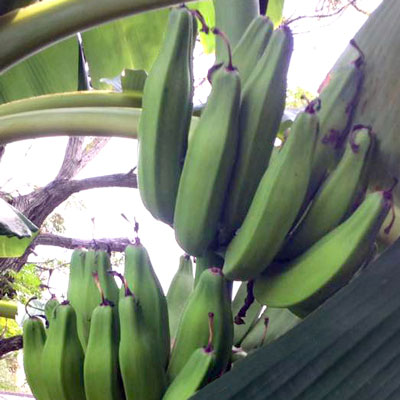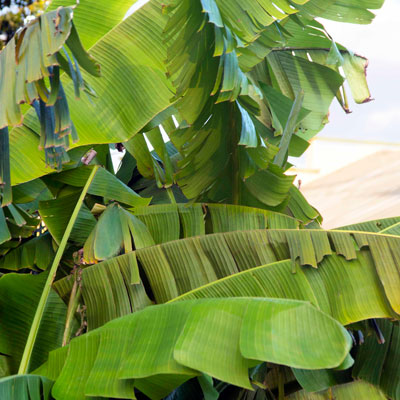Bananarama – What do we do?
“Will they mature?” and “How can I keep the plants over the winter?” I can predict with certainty that both of those questions will come up in the next few days. Here are my replies.

An especially nice fruit set for a home-garden banana, but it probably won’t have time to mature.
Will fruit ripen in time?
The short answer is, “Probably not.” Most of the clusters didn’t start forming until early fall, and that doesn’t allow enough time for the subtropical plants to complete their maturing. Of course, that depends on where you live in Texas and also in when the first freeze occurs in your area. The farther south you are in the state, the better your odds are. Covering the plants is possible, but it’s certainly not easy.
The unasked question is “Will the fruit be any good if it does ripen?” That depends on the variety, but in most cases they will probably not be of the quality you’re used to. They may even have seeds.

These leaves are frayed from the summer and fall winds. The plants will freeze to the ground, but where will they survive, and what can we do to help them pull through yet farther north?
Carrying the plants through the winter
In spite of the fact that they’re from tropical origins, banana plants are able to withstand sub-freezing temperatures and still survive to grow another year. They die back to their fleshy storage roots with the first freeze. Their stems and leaves will be soft and mushy the morning after that freeze, but moisture will drain quickly away over the following couple of days. At that point it will be fairly easy to clip off the dead tissues and send it to the compost.
As you’re mowing your lawn this month, you’ll be picking up fallen tree leaves in your mower bag. Empty the bag and pile the leaves atop the crowns of your banana plants. Cover each crown with 6 to 10 inches of shredded tree leaves, and secure a piece of burlap against the leaves to hold them in place. That will protect them in all but the coldest of winters. Should a cold spell take them out, all you’ll have to do is get a new plant come spring.
Dr. Julian Sauls, tropical fruit specialist with Texas A&M, wrote a very good sheet on bananas. Here is a link.
